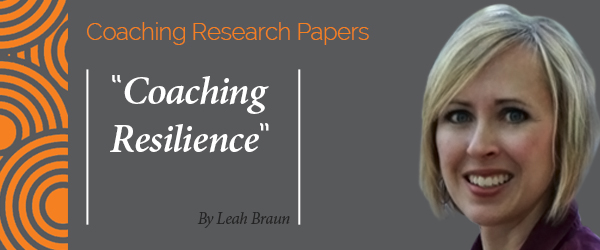
Research Paper By Leah Braun
(Life Coach, UNITED STATES)
Life is all about change. I believe human beings are amazing creatures. We experience transitions, big and small, on a daily basis. So how do we handle change? Do we flow through it and adapt or do we struggle through it and fight it? Resilient people are able to handle stress, stay focused, and accomplish their goals. Being resilient means more than just bouncing back: It means learning and growing in new ways. We often marvel at people who suffer a tragedy or loss and appear to come back strong than ever, yet we witness another person crumble as a result of a job loss, divorce, or death of someone close. I believe the former example is of a person who is resilient. A truly resilient person pays attention to his or her overall wellness – physical, spiritual, emotional and relational wellness.
Resilience is suppleness, give, spring, flexibility, elasticity, plasticity, pliability, springiness, strength, toughness, adaptability, hardiness as in the resilience of human beings.” (Collins Thesaurus of the English Language, 2002) This definition includes resilience in terms of human behavior as well as inanimate objects. Wisdom commons.org explains resilience as,
… the ability to work with adversity in such a way that one comes through it unharmed or even better for the experience. Resilience means facing life’s difficulties with courage and patience – refusing to give up. It is the quality of character that allows a person or group of people rebound from misfortune, hardships and traumas.
Sometimes clients seek out coaches because they face adversity or endure a hardship. If a coach can help a client achieve resilience, they have given the client a wonderful gift. According to Karen Reivich and Andrew Shatte in their book The Resilience Factor, “Everyone needs resilience. More than 50 years of scientific research have powerfully demonstrated that resilience is the key to success at work and satisfaction in life. It is the basic ingredient to happiness and success.” (Bounce, 2010)
How do we recognize a client who needs to build resilience?
There are many red flags, but one of the more prominent indicators is stress — everything from chronic daily stress to complete burn-out. Chronic stress is the building of daily pressures. (Wicks, 2010) A too- busy work schedule, lack of physical fitness, and chaos at home can combine to cause chronic stress. Powerful coaching techniques such as time management strategies and an examination of priorities can help a client with chronic stress. Psychologist Herbert Freudenberger coined the term “burn-out”: A depletion or exhaustion of a person’s mental or physical resources attributed to his or her prolonged, yet unsuccessful striving toward unrealistic expectations, internally or externally derived. (Bounce, 2010) The signs of burnout include cynicism, workaholism, isolation, boredom, depletion, conflict, arrogance, and helplessness. (Bounce, 2010)
I believe there are four pillars of resilience that each of us need in order to maintain overall wellness – physical, spiritual, relational, and emotional resilience. I often picture these components as fragile glass globes which we are constantly juggling. If we allow one globe to drop, it will shatter and throw everything else in our lives out of balance. I am not suggesting that a coach must address all four parts of resilience with his or her client. I am suggesting that all areas are inter-related, and if we notice lack of physical wellness when a client is asking for help with stress management, then that lack of physical wellness may become an issue which needs to be addressed by the coach or someone else equipped to help with it.
Starting with physical resilience, I believe it is one of the most visible parts of wellness. We can observe someone who smokes, is obese, or who works 80 hours per week. Exercise in particular is paramount in maintaining physical resilience. Physical activity helps your body and overall health in many other ways: controlling your weight; reducing your risk of heart disease; reducing your risk for type 2 diabetes and metabolic syndrome; reducing your risk of some cancers; strengthening your bones, muscles and joints; and increasing your chances of living longer.
(www.realwarriors.net) Especially as it relates to coaching, it is important to point out that physical activity can improve your mood; help keep your thinking, learning and judgment skills sharp as you age; reduce symptoms or risk of depression and protect psychological health; and help you get better quality of sleep so you feel awake and refreshed throughout the day. (www.realwarriors.net)
Spiritual resilience refers to your value system (your ethics or your moral compass), your search for meaning with purpose, and your connectedness with others. (Spiritual Care and Resilience Fitness Guide) Spiritual resilience goes beyond religion and permeates all parts of our being. The author of a resource I use with married couples asserts that
…a person of faith has a great advantage over one who does not have faith. (Gungor, 2011)
A person of faith is more equipped to answer life’s basic questions such as, “Why am I here?” or “Who am I?” A coach may encourage the client to seek out (or go back to) a faith with which the client is comfortable. According to the Spiritual Care and Resilience Fitness Guide, to develop and strengthen our spiritual fitness we can establish a regular time for meditation, reflection or prayer; establish a peaceful place, free from distractions, for thinking about spiritual matters; attend a spiritual or religious meeting; stand in the presence of nature to experience an overwhelming sense of beauty and awe; find happiness in everyday occurrences and be thankful; along with other spiritual practices.